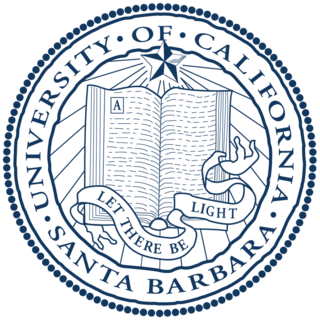
The University of California, Santa Barbara is a public land-grant research university in Santa Barbara, California, United States. It is part of the University of California university system. Tracing its roots back to 1891 as an independent teachers' college, UCSB joined the ancestor of the California State University system in 1909 and then moved over to the University of California system in 1944. It is the third-oldest undergraduate campus in the system, after UC Berkeley and UCLA. Total student enrollment for 2022 was 23,460 undergraduate and 2,961 graduate students.

The College of Creative Studies (CCS) is the smallest of the three undergraduate colleges at the University of California, Santa Barbara, unique within the University of California system in terms of structure and philosophy. Its small size, student privileges, and grading system are designed to encourage self-motivated students with strong interests in a field to accomplish original work as undergraduates. A former student has called it a “graduate school for undergraduates”. The college has roughly 350 students in nine majors and approximately 60 professors and lecturers. There is an additional application process to the standard UC Santa Barbara admission for prospective CCS students, and CCS accepts applications for admissions throughout the year.

El Plan de Santa Bárbara: A Chicano Plan for Higher Education is a 155-page document, which was written in 1969 by the Chicano Coordinating Council on Higher Education. Drafted at the University of California Santa Barbara, it is a blueprint for the inception of Chicana/o studies programs in colleges and universities throughout the US. The Chicano Coordinating Council expresses political mobilization to be dependent upon political consciousness, thus the institution of education is targeted as the platform to raise political conscious amongst Chicanos and spur higher learning to political action. The Plan proposes a curriculum in Chicano studies, the role of community control in Chicano education and the necessity of Chicano political independence. The document was a framework for educational and curriculum goals for the Chicano movements within the institution of education, while being the foundation for the Chicano student group Movimiento Estudiantil Chicano de Aztlán (MEChA).

Writing centers provide students with assistance on their papers, projects, reports, multi-modal documents, web pages, and other writerly needs across disciplines. Although writing center staff are often referred to as Tutors, writing centers are primarily places for collaboration in which writers and tutors work together to help writers achieve their goals. Typical services include help with the purpose, structure, function of writing, and are geared toward writers of various levels and fields of study. The goal is to help a writer learn to address the various exigences that they may encounter with the realization that no writing is decontextualized—it always addresses a specific audience. Writing centers may offer one-on-one scheduled tutoring appointments, group tutoring, and writing workshops. Services may also include drop-in hours. Writing tutors do not assign grades to students' writing assignments.

Composition studies is the professional field of writing, research, and instruction, focusing especially on writing at the college level in the United States.

The University of California, Santa Barbara Library is the university library system of the University of California, Santa Barbara in Santa Barbara, California. The Library includes four facilities: Two libraries and two annexes. The library has some three million print volumes, 30,000 electronic journals, 34,450 e-books, 900,055 digitized items, five million cartographic items, more than 3.7 million pieces of microform, 167,500 sound recordings, and 4,100 manuscripts. The Library states that it holds 3.2 miles (5.1 km) of manuscript and archival collections.

First-year composition is an introductory core curriculum writing course in US colleges and universities. This course focuses on improving students' abilities to write in a university setting and introduces students to writing practices in the disciplines and professions. These courses are traditionally required of incoming students, thus the previous name, "Freshman Composition." Scholars working within the field of composition studies often have teaching first-year composition (FYC) courses as the practical focus of their scholarly work.

The Gevirtz Graduate School of Education is a graduate school at the University of California, Santa Barbara which specializes in the field of education and counseling, clinical and school psychology. It is located in technology-enabled Education Building which has been built in 2009 on the UCSB campus. In 2013, the Gevirtz School was once again named one of the best graduate schools of education in the United States by U.S. News & World Report. In addition to its graduate programs, it also contains the Koegel Autism Center, Hosford Counseling & Psychological Clinic, the Psychology Assessment Center, and the McEnroe Reading & Language Arts Clinic. The Gevirtz School has a pre-K – 6 laboratory school, The Harding University Partnership School, in the Santa Barbara Unified School District.

The College of Engineering (CoE) is one of the three undergraduate colleges at the University of California, Santa Barbara.

Reflective writing is an analytical practice in which the writer describes a real or imaginary scene, event, interaction, passing thought, or memory and adds a personal reflection on its meaning. Many reflective writers keep in mind questions such as "What did I notice?", "How has this changed me?" or "What might I have done differently?" when reflecting.
Threshold knowledge is a term in the study of higher education used to describe core concepts—or threshold concepts—which, once understood, transform perception of a given subject, phenomenon, or experience.
Revision is a process in writing of rearranging, adding, or removing paragraphs, sentences, or words. Writers may revise their writing after a draft is complete or during the composing process. Revision involves many of the strategies known generally as editing but also can entail larger conceptual shifts of purpose and audience as well as content. Within the writing process, revision comes once one has written a draft to work with, so that one can re-see and improve it, iteratively. Working at both deeper and more surface levels a writer can increase the power of the text.

The rhetorical situation is an event that consists of an issue, an audience, and a set of constraints. A rhetorical situation arises from a given context or exigence. An article by Lloyd Bitzer introduced the model of the rhetorical situation in 1968, which was later challenged and modified by Richard E. Vatz (1973) and Scott Consigny (1974). More recent scholarship has further redefined the model to include more expansive views of rhetorical operations and ecologies.
The Center for Information Technology and Society at the University of California, Santa Barbara was founded in 1999 to support the interdisciplinary study of the cultural transitions and social innovations associated with contemporary information technology. CITS accomplishes this by connecting scholars in different disciplines studying similar phenomena related to technology and society, through both formal events and informal meetings of the center's faculty research affiliates. Currently, CITS faculty represent 13 departments on campus, spanning the Social Sciences, the College of Engineering, and the Humanities. In addition, the center supports graduate study through the administration of the Technology & Society Emphasis on campus. CITS is housed in the campus Office of Research, as a unit of the Institute for Social, Behavioral, and Economic Research at the university.
The College of Letters and Science is the largest college at the University of California, Santa Barbara. The College, which offers 90 majors and 38 minors to over 20,000 undergraduates and 2,000 graduate students, has about 700 faculty members.
Writing about Writing (WAW) is a method or theory of teaching composition that emphasizes writing studies research. Writing about Writing approaches to first-year composition take a variety of forms, typically based on the rationale that students benefit when engaging the "declarative and procedural knowledge" associated with writing studies research.
Chela Sandoval, associate professor of Chicana Studies at University of California, Santa Barbara, is a noted theorist of postcolonial feminism and third world feminism. Beginning with her 1991 pioneering essay 'U.S. Third World Feminism: The Theory and Method of Oppositional Consciousness in the Postmodern World', Sandoval emerged as a significant voice for women of color and decolonial feminism.
Writing center assessment refers to a set of practices used to evaluate writing center spaces. Writing center assessment builds on the larger theories of writing assessment methods and applications by focusing on how those processes can be applied to writing center contexts. In many cases, writing center assessment and any assessment of academic support structures in university settings builds on programmatic assessment principles as well. As a result, writing center assessment can be considered a branch of programmatic assessment, and the methods and approaches used here can be applied to a range of academic support structures, such as digital studio spaces.

Asao B. Inoue is a Japanese American academic writer and professor of rhetoric and composition in the College of Integrative Sciences and Arts at Arizona State University whose research and teaching focus on anti-racist writing assessment. In 2019, Inoue was elected the Conference on College Composition and Communication (CCCC) Chair. He delivered the keynote presentation for the 2019 CCCC Annual Convention, entitled "How Do We Language So People Stop Killing Each Other, Or What Do We Do About White Language Supremacy?" Inoue is the recipient of multiple disciplinary and institutional academic awards, including the 2017 CCCC Outstanding Book Award, the 2017 Council of Writing Program Administrators (CWPA) Best Book Award, and the 2012 Provost's Award for Teaching Excellence at California State University, Fresno.
Rita Raley is an American researcher who focuses on digital literature. Her research interests include new media, electronic literature, digital humanities, contemporary arts, activism and social practices, tactical media, global English, discourse on globalization, and language and information politics.











